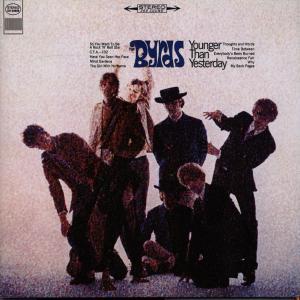It is a trait of the music world that often bands only attain genuine critical acclaim when their records become less commercially successful. Sometimes this is genuinely down to the greater profundity of the music, but one is often left wondering what was "wrong" with the earlier work. Perhaps shifting millions of units makes something inherently suspect in the eyes of some.....
The Byrds are an example of this phenomenon. After their initial burst of success in 1965/66, their music became experimental, and therefore less appealing to the masses. These days, when serious critical study of their catalogue is conducted, the period of 1967/68 is lent most credibility.
Younger Than Yesterday was very much a transitional album. Gene Clark was no longer involved with the group, and his departure had the effect of liberating and motivating the other songwriters in the Byrds.
Certainly on this album David Crosby made some of the most concise and expressive musical statements of his whole career, the spine-tingling "Everybody's Been Burned" being the highlight.
The most surprising side-effect of the re-alignment within the Byrds was the emergence of Chris Hillman as a songwriter of real stamp, and his vocal and instrumental contributions also became more prominent. "Have You Seen Her Face" is one of the hidden gems in the Byrds entire canon, with its engrossing melody and dense guitar sound.
Younger than Yesterday is less compact and cohesive than its successor, The Notorious Byrd Brothers, or even its predecessor, Fifth Dimension, and this can leave it sounding quite dissonant in comparison. However, song-for-song it is stronger than either of those albums, and has some moments of sheer beauty and genius (in addition to the songs already mentioned, "Renaissance Fair" comes to mind).
Unlike their earlier records, this one feels like a modern rock album, with the involvement of guests and session musicians providing variety and texture. This all represented a shift away from the staid "beat group" format. Foremost among these guests was Clarence White, whose distinctive "twangy" guitar parts would become a feature of later Byrds efforts.
I know that there has been come criticism of the decision to include a cover of Bob Dylan's "My Back Pages" on this LP. Amongst the innovative and adventurous material, it sounds like a backward step. I would not disagree, but the Byrds make a fine fist of the song, and it acquires an even more wistful tone in this setting.
In keeping with the Zeitgeist, and their own musical detours, there is continuing evidence of the influence of Indian music and jazz. On the psychedelia front, only "Mind Gardens" misses the bullseye, appearing somewhat self-indulgent and pretentious. Admittedly, this was not uncommon in the music world circa 1967!
The closer on the original album, "Why", sounds more futuristic even than some of the other numbers, and tracks like this help to explain why the Byrds became so seminal a touchstone for many acts of future decades.
If you are searching for the ultimate psychedelic rock album, albeit one which retains a core of catchy and memorable songs, then Younger Than Yesterday may just be it.

No comments:
Post a Comment